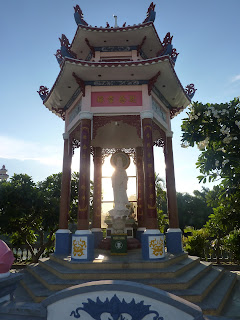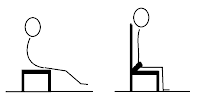In trying to understand and describe the various, co-existing and intermingling belief systems, religions, philosophies and traditional and modern influences here in Vietnam, the best analogy I can think to use is that of being at a big buffet. This post might seem to make light of what can be contentious subjects, but my intention is certainly not to disrespect what can be personal and deeply held beliefs. I respect that everyone has the right to make sense of life any way they want or need, in order to have peace with their actions and direction. This is just my way of trying to describe the complex, varied, and yet generally pragmatic mixture of beliefs here.
So please, open your minds.... and welcome to the Big Belief Buffet!
--------------------------------------------------------------------
I'd like you to imagine a beautiful room, with numerous tables laden with a wide range of dishes, to suit all tastes and appetites. It's generally very calm and peaceful and welcoming, and it appears that you're free to choose and mix anything you want.
But before you get busy fixing up a delicious meal, you'll be given a plate pre-served with some items. It'll be quite difficult to get any further without taking one. And you should be aware that the mirrors are two-way. The management operate a 'right of admission reserved' policy, and don't take kindly to 'trouble-makers'...
-------------------------------------------------------------------
Pre-served items:
To begin you'll have a large spoon of nationalism - a result of justified pride, censored media and extensive propoganda. (To be fair, when you've fought for numerous centuries to expel invaders, dealt with aggressive interferers, united yourselves and built a rapidly growing economy, I think you're intitled to feel a little bit pleased with yourselves.)
To accompany this you'll have a good sprinkling of love for 'Uncle Ho' (Hồ Chí Minh) on there. In fact his picture may well be on your plate. Mr Ho is revered and celebrated throughout Vietnam, for forming the Democratic Republic of Vietnam in 1945, and for being, at various times, Vietnam's motivator, activator, speaker, champion of the people, President, Prime Minister and until his death in 1969, military leader of the Viet Minh.
Then you'll have some Confucianism - a very slow-cooked dish from China. For centuries these ancient teachings have influenced (and continue to influence) everything in Vietnam from national structure to community organisation, education and working life to family relations and social interactions. This complex dish is overall quite healthy. It's remarkably relevant and practical, with respect for your parents, elders and teachers, thankfulness and rememberance of your ancestors, dedication to education, and self-responsibility being some of the main ingredients. There is, however, a slightly bitter after-taste, which seems to suit men more than women; according to Confucious, men are ultimately superior to the fairer sex. This dish is distinctly more popular with the older generations, and some youth try to hide it under their chopsticks, regarding it as a bit old-fashioned.
Another of the 'compulsory' items on your plate will be a fair sized dollop of Communist policy, structure and conformism. You don't have to eat a whole plateful (only roughly 3% of the population are Party members) but it's definitely frowned upon to refuse it altogether.
Then there'll be a few of the long-standing and enduringly popular folk dishes. These classics have evolved through centuries of rural, agricultural lifestyles - worship of plants, animals and fertility are integrated into most customs and practices of Vietnamese people.
According to everything I've read, you'll also have a bit of Daoism (or Taoism) - ancient recipes for living life, based on the concept of flow, or 'the way'. Kindness, simplicity and modesty are key (nicely demonstrated by shopping at the market with Vietnamese friends - sparkles, glamour and no holding back in telling you that you look ugly and fat!??) along with maintaining the balance between humanity and the cosmos (again - the lack of concern for the environment shown by most of the people I've met and worked with might bring the Tao influence here into question...) But still, I reckon it's a pretty nutricious dish, and we'd all do well to take a bit.

And then it's unfortunate but unavoidable that you'll have a serving of nepotism gravy - covering everything from what job you can apply for (or have a chance of getting), who you can marry, where you can buy land....
--------------------------------------------------------------------------
OK, so now you can take your already pretty well-loaded plate and go explore the rest....
---------------------------------------------------------------------------
Optional items:
Guidelines
In general, you can take and mix whatever you like. Most people are busy fixing up and eating their own meals, and will let you get on with yours quite peacefully. If you find you have a favourite table and choose to stop there for the entire time, then you'll be generally be respected for it. Attendents check up on the behaviour at tables pretty regularly, but they're apparently becoming more easy-going than they have been in the past.
---------------------------------------------------------------------------
Now let me describe some of your extensive spiritual buffet options....
The majority of people will take some Buddhism;
Fancy visiting the beautiful and peaceful pagodas (very popular), maybe including prayers to statues of Buddha and other bodhisattvas, lighting incense sticks and taking offerings of food, drink and money?

How about a statue or image of Buddha in your family alter, in the front of your bus, or on a necklace around your neck?
You'll happily help yourself to some belief in fate and quiet acceptance of life's trials.
You’ll most likely ignore the plates of meditation or yoga – they don't really suit the Vietnamese palate.
You might pick up some belief in re-incarnation, but unless you're a monk or nun it’s very unlikely to make you vegetarian or abstinent. The meat dishes and beer on the table are quite irrestistable….
You’ll definitely want some ancestor veneration / remembrance;
I heartily recommend the ‘Ancestor Party’ dishes – days of eating, drinking and remembering ancestors with the extended family. And spending the afternoon sleeping it off. They're great.
Remember, your parent's, grandparent's and great-grandparent's spirits live in the family alter alongside the God of the Home (it's like a tardis, don't worry, there's plenty of room), and they get pretty hungry, so pick up some extra fruit, sweets and drinks to replenish it when you get home. And don't forget to throw in some beers and cigarettes for grandad.

At the next table you might pick up some Christianity;
Catholicism is more popular than Protestantism, but both are available. If you're keen on it, you can go to Mass every Sunday. There are quite a lot of churches. Other people ignore this table completely. A lot of people just pick up some of the junk food - like the gaudy, sparkly, plastic, badly-sung and hip-hop Christmas items, which should, in my opinion, be banned altogether!

Small Islam and Hindu tables cater for some people from the Cham ethnic minority, but aren't of much interest to the general population.
A newly available, very popular and rapidly expanding area of this buffet is the Capitalism table; the rich foreign flavours proving very addictive for those who try it. Whilst some of the dishes are undeniably nutricious, some people say the flavours don't mix so well with the items already on the plate. And sometimes people find the dishes on this table so irresistable that they eat too much and get a bit sick.
And just next to the Capitalism dishes are the imported(?) Consumerism treats; very tempting, very easy to eat, and proving very popular, but the long-term health effects are questionable and the floor around the table is covered in discarded plastic wrappings.
The 'foreign flavours' table is completely surrounded by excited teenagers, and mostly ignored by older generations. Korean 'dishes' are particularly popular (fashion, movies, singers...) as is English football ("No, I'm not from Manchester... sorry, no, not Liverpool either...")
Condiments of ghosts, spirits and other superstitions can be found on most of the main tables - and can add significant flavour to your plate. Mediums and fortune tellers are on hand to advise you on selection.
Some people prefer to have their plates designed and made up for them.
For them there is the option of the locally-produced Cao Đài platter - which appears to be a combination of most of the above (minus the capitalism, consumerism, meat and beer). Folks who order this seem to have an ethos of a great big hug - "all religions have one same divine origin, one same ethic based on love and justice, and are just different manifestations of one same truth", however some people find aspects of the platter a bit too unusual to be palatable.
So thats most of it. Quite a selection.
I'm sure I've missed, misunderstood or misrepresented some things, please don't hesitate to let me know...
------------------------------------------------------------------------
After such a feast, desert is simple and very Vietnamese - some good humour....
humanity, pragmatism, astounding aesthetics and, of course.....
....... karaoke!!









